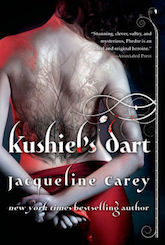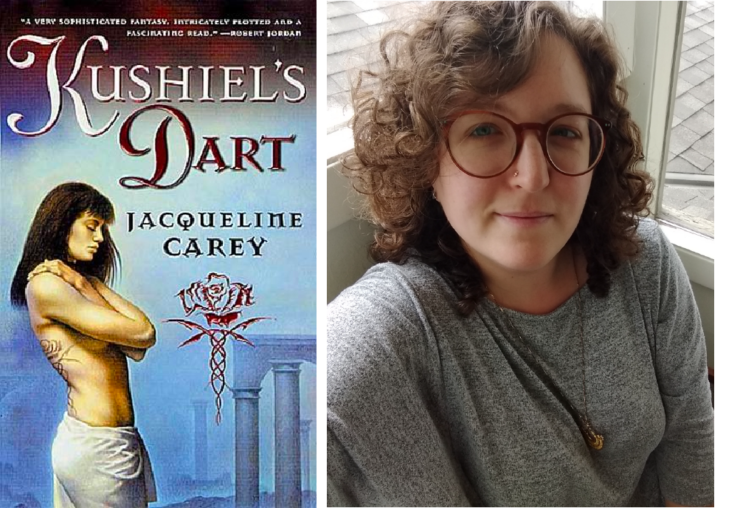Like many people my age, my first exposure to queer texts was through fanfiction. Reading Firefly and RENT slash back in the early 2000s was an education in male/male tension and longing and, yes, sex. I’ve traded the same joke back and forth with fellow female fans that I knew all about gay sex before I even learned any of the mechanics of heterosexual intercourse. Even so, it all felt very binary. A character was either gay or straight. If they had interactions with both men and women, one of these experiences was just an excuse before they “chose a side.”
My favorite fantasy novels also had a healthy amount of sex, from Ranita Glasswright exploring her options to Alanna of Trebond gladly courting three (male) suitors at once before deciding which one she wanted to spend the rest of her life with. But these were all straight romances, so the characters’ sexual orientation was not so much a defining feature as a given one; lady knights and female glasswrights alike chose male partners. Then I met Phèdre nó Delaunay.
To identify as bisexual simultaneously feels like too much information and like it’s not relevant enough to be commented on. So you’re attracted to both men and women, I imagine people saying—and? What’s your point? Or I share this dimension of myself and suddenly I can see the wheels turning, spooling out combinations, and now the other person is thinking more about my sex life than I want them to.
*
If I tell you that all of my experiences with women or genderqueer people have been somewhat experimental, does that reinforce societal stigmas about women being only “bicurious” and undermine the notion of bisexuality?
*
I first borrowed Kushiel’s Dart about six years ago from a friend who for this year’s Pride posted a Facebook status about how her marriage to a man doesn’t change her bisexuality. She was in turn borrowing the book from another friend, who sometime in the intervening years has also come out as bi. There is something so wonderful about the idea of this novel being passed from bi lady to bi lady like some sort of introductory text.
Buy the Book


Kushiel’s Dart
The eponymous Kushiel’s Dart, Phèdre is a gods-touched courtesan-spy in the fantasy land of Terre d’Ange. Over the course of her service as Naamah’s Servant, she moves through the bedchambers of nobility as a plaything, to the halls of foreign palaces as an ambassador. She takes Joscelin Verreuil as a male consort but maintains ongoing relationships with patrons like Nicola L’Envers y Aragon, and has one of the greatest lover/nemesis relationships with Melisande Shahrizai, a fellow scion of Kushiel and a woman who represents the inverse of Phèdre’s every aspect.
But Phèdre’s queerness is not what makes her unique.
Terre d’Ange is governed by just one precept: “Love as thou wilt.” Its openness is a gift, tacit permission requiring no further clarification: Love one partner only for your entire life? Love many people at different points? Love courtly intrigue and overthrowing monarchies? Do what you will, so long as you love it. Most D’Angelines are bisexual, open to whatever relationships may come their way.
*
If I tell you that every time I’ve been with a woman (or genderqueer person) a cis man was also present, will you automatically file it under “doesn’t count”?
*
Kushiel’s Dart was very much the “right book, right time” kind of kismet, possibly down to the month. I was a year out of college and freelancing after the kind of media job layoff that people in my industry are all too familiar with. I was also recently out of a five-year relationship that had encapsulated most of my firsts, and actually dating for the first time.
Trying to keep my head above water professionally and personally put me very much in a state of going with the flow: taking freelance jobs as they came, grabbing time with similarly underemployed friends because who knew when one of us would get hired full-time, and being more open to dating experiences I would normally discount. When a friends-with-benefits suggested that his female friend “hang out” with us one night, I said yes without overthinking it.
*
If I share a private detail of my love life, am I convincing you, or am I undermining myself? If you know this new information about me, am I somehow giving up control in our relationship?
*
The thrill of new partners, new sensations, is a perk of Phèdre’s assignations. The point is knowledge. While Elua’s “love as thou wilt” encompasses all of Terre d’Ange, each of his angels has their own guiding principle. Shemhazai’s is “all knowledge is worth having”—a key tenet under which Phèdre’s mentor Anafiel Delaunay trains his courtesan-spies. From seduction to pillow talk, pain to pleasure, they must always be aware of the tiniest detail about their patrons, able in the moment to file away a tidbit for later extraction and examination.
I said yes to new experiences, even and especially the ones that scared me, because I wanted to learn something new about myself. I could be uncomfortable or unmoved, could decide that I was very much straight, but at least I would know.
*
If I tell you that I never saw myself ending up with a woman, does that invalidate the flutters I felt flirting over text? The giddiness of holding hands in public and sneaking kisses because we were just into each other? The lack of mind games that characterized so many of my dates with straight men?
*
Many bisexuals describe feeling either like they are constantly coming out, or like there is no point to coming out—especially if they’re partnered to someone of the opposite gender. I’m married to a man, and we’re monogamous, so again, it feels TMI to even bring up past dalliances. But bisexuality is not about who you sleep with; it’s about who you’re attracted to.
Knowledge is power, and sometimes that is power wielded against Phèdre: her own intel drawn out of her without her consent, a betrayal in the bedroom. She lets desire cloud her judgment, and lives are cut short because of it. She unwittingly plays into Melisande’s game of thrones, but amidst the heartbreak and loss, she gains necessary and painful knowledge about herself—enough to change and shape herself. Enough to grow up.
I want sexuality to be acknowledged as more of a spectrum than a binary. I want my kids to know that they can be attracted to men, women, genderqueer people, nonbinary folks—to anyone and everyone, or to only a specific kind of person. I want them to learn and love and have everything they need to make informed decisions. I want them to not have to come out, but just to be.
Natalie Zutter just got her first tattoo (nothing Kushiel-related) and approached it in much the same way—as a new experience worth having. Talk Kushiel’s Dart and/or bisexual pride with her on Twitter!










